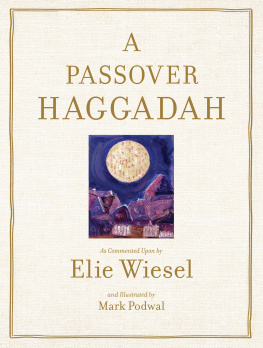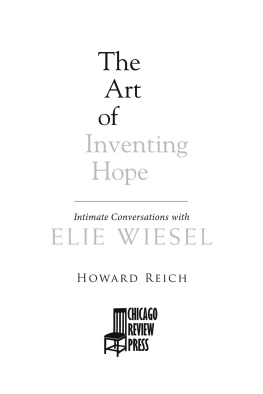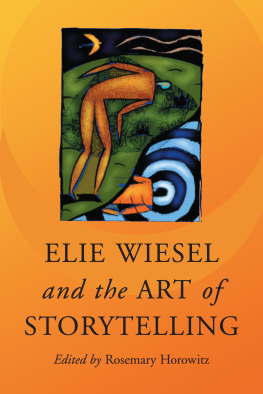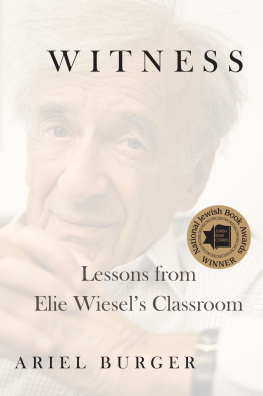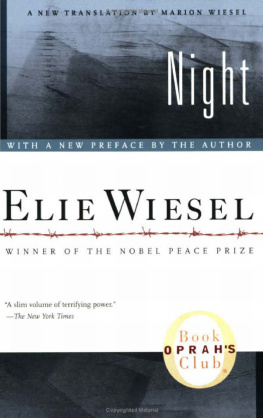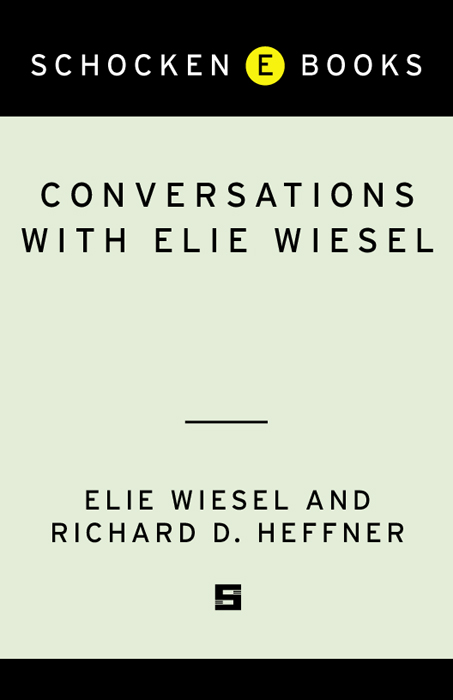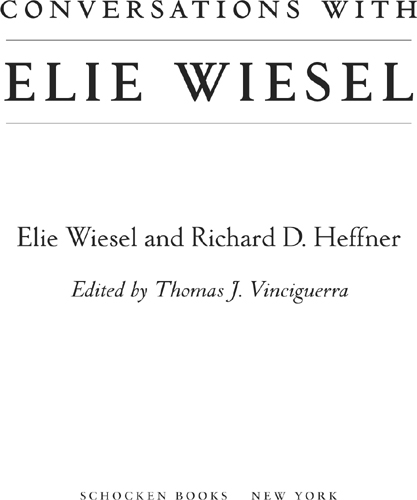ALSO BY RICHARD D. HEFFNER
Contents
12
Introduction
O F THE HUNDREDS of distinguished persons who have graced The Open Mind since I began to produce and moderate my weekly public television series in 1956, Elie Wiesel is unquestionably the one I most closely identify with the programs very purpose: to probe as deeply, as honestly, and as freely as concerned men and women can into both the clearly universal and the seemingly more personal issues that today must challenge all thoughtful individuals.
Surely his breadth of humanistic understanding, his profound wisdom, his always reassuring presence, together with the warmth of our personal relationship, have all combined to make him the programs quintessential guest. And the very degree to which Elies beliefs are so deeply rooted in and reflect his Judaic tenets and traditions, while mine are quite so secular, has, I hope, added an important and provocative dimension to the quality of our exchanges as together we embrace John Miltons singular query: Who ever knew Truth put to the worse, in a free and open encounter?
Among the earliest of my on-the-air discussions with Elie was a segment entitled Beyond the Holocaust. And indeed, although the Holocaust has necessarily informed all of his public appearanceshow could it be otherwise?it soon became clear to both of us that the thoughts Elie was sharing with me and our audience extended far beyond his continuing reflections on that uniquely horrific calamity. So with a view toward creating an offering of even more general public interest, we decided to undertake a series of special television and home-video Dialogues on more or less cosmicthough still profoundly personalthemes on which Elie very much wished to comment, and to which he invariably brought to bear the weight of a profoundly moral perspective clearly derived from his religious beliefs.
Indeed, in explaining his point of view Elie had once pointedly commented to me on an Open Mind program that whatever we do must be measured in personal moral terms. That became the hallmark of our Dialogues together, and each time I borrowed from my partner to introduce our discussions:
Whatever paths nations follow or overarching choices mankind makes about issues that universally claim our attention, surely it is instead whatever individual men and women, you and we, decide and then do about these issues much closer to home and hearth that truly looms larger; so that whatever we do must be measured in personal moral terms.
The reader should know then that the eleven chapters herein were distilled from nearly two dozen half-hour Open Minds and Dialogues, as well as from discussions conducted specifically for this volume. Preparing this material for book form has, of course, presented many challenges. Transcripts can rarely be published intact. Digressions, false starts, and other such intrusions on narrative flow must be straightened out. Yet to do so by usual editorial standards might scar Elies unique method of inquiry. While I ask questions, Elie so frequently answers them by asking still others.
Therefore, while as much of our original exchanges has been preserved as possible, at the same time liberties have been taken. Several of the themes Elie and I explored more than once have been integrated. Major portions and minor passages from different programs have been freely intermixed when they seemed to speak to each other. And on rare occasions conversations that led into territory from which there was no easy return have been excised.
Perhaps the biggest obstacle to overcome was the fleeting nature of the subject matter. As a glance at our chapter titles shows, these exchanges address some of the most vexing social and spiritual dilemmas of our times. However, the backdrop to these issues is a world that is ever changing. (The events are too many, and they go very fast, too fast, Elie notes at one point.) So topics that no longer command our immediate attention have been dispensed with. And in the case of ongoing happenings like the strife in the former Yugoslavia and the Middle East, some of our more specific references have been modified to make them more general and enduringall the while with the knowledge that events may yet overtake even our best intentions.
One of the happier results of this surgery has been the Interludesthose short Wiesel reflections found between the individual chapters. These were portions of our original programs that did not quite fit into the newly formed whole but were simply too compelling to toss aside. They offer memorable, often vivid insights into Elies essential spirit, his incomparable understanding of the nature of human nature.
Conversations with Elie Wiesel takes us both back a good many years, through a generation of warm friendship and mutual respect, of affection, indeed of a brotherly love that I know we feel equally. Alwaysas I think our viewers have long realized, and as I hope our readers will, toocivility and a continuing search for the truth and for a sense of personal responsibility in framing our responses to challenges have characterized our work together.
In all of this cooperative endeavor, of course, particularly in the translation of the many years of my broadcast exchanges with Elie into the pointed Conversations that follow, I owe an unending debt of gratitude to the extraordinary editorial skills of my accomplished good friend and our indefatigable colleague Thomas J. Vinciguerra.
My thanks, too, to the Charles H. Revson Foundation and its president, Eli N. Evans, for generous support in the final preparation of this volume; to Daphne Doelger-Dwyer, for hard work and unending patience that are always beyond the call of duty; and to my wife, Dr. Elaine Heffner, for trying so nobly to help me understand the traditions and beliefs she shares with our dear friend Elie Wiesel.
R ICHARD D. H EFFNER
August 5, 2001
Elie Wiesel Richard D. Heffner: Dialogues: A Series of Conversations on the Crucial Issues of Our Times. A Production of Richard Heffner Associates, Inc. and Alvin H. Perlmutter, Inc., Distributed by SISU Home Entertainment Inc., Cherokee Station, P.O. Box 20405, New York, NY 10021
ONE
Am I My Brothers Keeper?
Elie, this is a question that perhaps is not understood too well by a good many people in our time. What does it mean to you?
It is a question that Cain asked of God, having killed Abel: Am I my brothers keeper? And the answer, of course, is, we are all our brothers keepers. Why? Either we see in each other brothers, or we live in a world of strangers. I believe that there are no strangers in Gods creation. There are no strangers in a world that becomes smaller and smaller. Today I know right away when something happens, whatever happens, anywhere in the world. So there is no excuse for us not to be involved in these problems. A century ago, by the time the news of a war reached another place, the war was over. Now people die and the pictures of their dying are offered to you and to me while we are having dinner. Since I know, how can I not transform that knowledge into responsibility?






